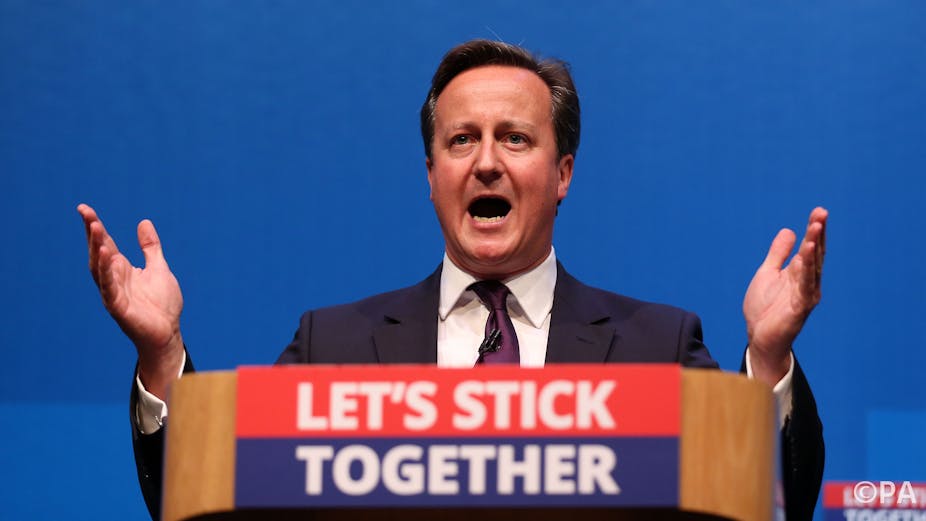On Monday, prime minister David Cameron delivered a big speech in Aberdeen on the Scottish independence referendum. It was a masterly performance.
He spoke of the shared histories of Scotland and England, of the achievements of both countries united for 300 years. He highlighted extra powers to be devolved to the Scottish parliament – agreed with the leaders of the Labour Party and the Liberal Democrats – should Scots reject independence at the ballot box.
Cameron spoke plainly and with conviction. He sounded like he believed in what he was saying. Listening to it live, I even wondered if it might go down in history as a landmark, a turning point for the Better Together campaign which, over the last fortnight, has been haemorrhaging support and looking like it was in a state of free-fall.
Perhaps Cameron, drawing on what he imagines to be the moral authority of his office as prime minister, hoped his speech would save the Union.
Backbench grumbles
Within minutes of finishing his speech, however, right-wing Tory backbenchers such as John Redwood and Bernard Jenkin – the latter a long-time critic of the prime minister – were on the phone to journalists, vowing to block further powers and financing to the Scottish parliament unless a new settlement could be reached with England.
The Barnett formula, which the Treasury has used since the 1970s to allocate additional funding to Scotland, has been singled out for specific criticism. Many MPs representing constituencies south of the border think it is unfair and argue that it insulates Scottish public services from cuts to public spending that those resident elsewhere in the UK have no choice but to wear.
It must have made for a long and lonely journey back to London for Cameron and his staff. Any good they might have expected to come of his speech on the eve of the poll has now been comprehensively undone by several of his party’s own MPs.
All of this has helped stoke one of the strongest arguments for the Yes campaign, which has been quick to point out that the pledge by the leaders of the pro-Union political parties may not have the backing of their parliamentarians at Westminster.
For example, Scotland’s deputy first minister, Nicola Sturgeon, argued that voting No carries little guarantee of constitutional change. This is important, as beefing up powers for the Scottish parliament – a commitment to so-called “Devo Max” which the prime minister refused as a third option that could have been put on the ballot paper – has broad support across the Scottish electorate, among voters on both sides of the independence argument.
According to Sturgeon, the agreement between Cameron, Lib Dem leader Nick Clegg and Labour’s Ed Miliband is a promise they can’t claim to be able to keep. They are treating Scottish voters “with contempt”, she said.
Perfect storm for PM
Cameron’s problems are compounded further by speculation about his future should Yes win. Sources close to the powerful 1922 committee of backbench Conservative MPs have said Tory backbenchers are being canvassed about whether he should resign if Better Together loses.
With the London mayor Boris Johnson planning to return to parliament as a Tory MP next year, the prime minister’s critics can now imagine their party being headed by a popular new leader in the not-too-distant future. It is difficult to envisage how Cameron could continue as prime minister after agreeing, two years ago, to a referendum that resulted in the break-up of the very country he was elected to lead.
Politically, Cameron is now caught in a perfect storm. Hoping that the No campaign will prevail despite its strategic blunders and self-inflicted wounds may not be enough to save his premiership. A narrow margin could be no more than a Pyrrhic victory.
Labour’s lead in the polls is growing ahead of a UK general election, now less than a year away. Under pressure from Nigel Farage, Cameron has promised to hold a referendum on Britain’s membership of the EU in 2017. At the time, he bargained that this would satisfy Eurosceptic voters that his party risks losing to UKIP. Badly bruised from campaigning, as he might put it, against the break-up of Britain, will Cameron have the appetite to come back and fight another divisive referendum campaign after this week’s vote?
Labour pains
The debate over Scottish independence offers him one consolation, though. The Labour Party views Scotland as its territory. With a bigger political stake in the result of Thursday’s referendum than any other Unionist party, its leaders are desperate for Scots to reject independence. But tens of thousands of their own supporters have broken with Labour – that most tribal of political parties – for the first time, saying they would vote Yes. This could destroy Labour’s electoral base north of the border.
Labour needed this like a hole in the head. That’s why the Labour Party have committed significant capital and resources to slugging it out with the nationalists, whose reach now extends deep into their rank and file.
This is also why, if a victory for the Yes campaign renders Cameron’s future as prime minister untenable, it should rightly also raise questions about Miliband’s leadership too.

